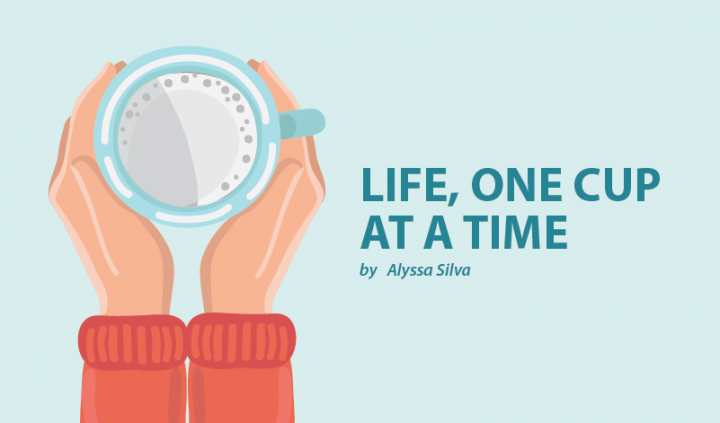How a Stranger’s Words Pulled Me Out of a Rut
Written by |

I always struggle with mental health at this time of year. Winter has that effect on me. Each year, I tell myself things will be different, so I map out a game plan for avoiding falling into my yearly rut. Podcasts are queued, books patiently wait to be read on my Kindle, and my long to-do list for the season hopes to be marked off. Yet, each year I forget just how challenging winter can be and how unmotivated I am as a result.
Between being cooped up to avoid as many germs as possible, locking myself indoors because it’s bitterly cold outside, and fewer hours of daylight, I sometimes feel like a total train wreck of emotions. Amid these feelings, I become angry with myself because it’s so not me to be acting that way. I’m a foreigner in my own body, and the worst part is that this happens every year.
Of course, there are moments when I am “me” again. Recently, my brother had some friends over, and by some twist of fate everyone was healthy, so I invited myself over. Sorry, I’m not sorry. Friends come to visit me when they can, I sneak out to coffee shops here and there (while silently panicking about germs), and I partake in random activities like driving an hour to the beach during snow squalls just to get a breath of salty air. It’s in these little moments when I feel most like myself again.
However, despite what my Instagram grid suggests, the majority of these long winter months are spent at home in solitude. (Surprise! I post a lot of old pictures!) And living in solitude can be a dangerous game to play. Thinking turns into overthinking, worries become false realities, and ruts suddenly feel all too familiar.
Just this weekend, I found myself in this place. It’s now, around the halfway mark of winter, that my emotions consume me and my life feels stagnant and murky. False pretenses cloud my head, convincing me I cannot do anything right and simply lack the motivation to be whom I’m supposed to be. On top of my seasonal affective disorder, I have been battling the worst vertigo for about a week now. (I probably should be resting and not writing this right now. Oops.)
I spent much of this past weekend trying to nurture my emotional well-being and manage my dizziness. When I’m in a vulnerable place, I let my thoughts run amok. I tell myself things that shouldn’t hold space in my head. I beat myself up over practically nothing. I enter this vicious cycle of self-depreciation for an unpredictable amount of time.
Sunday night was different, though. After a weekend of emotional defeat, I randomly found myself looking at my blog’s statistics. I was clicking buttons and half paying attention when I discovered the sweetest blog post written about my friend Robert Kraft, owner of the New England Patriots, and me. It was hard for me to believe that someone would group me into the same category as him, but there I was hanging onto every word and completely sobbing at my laptop. I don’t deserve the outpouring of support and kindness the blog author gave me, but reading it also made me realize I don’t deserve to treat myself as harshly as I sometimes do.
My thoughts keep trailing back to that blog and how a stranger’s kindness on the internet pulled me out of a rut that trapped me. The more I reflect on that blog, the more I understand that words heal. Whether it’s an encouraging text from a friend, a book quote, or a stranger’s thoughts on the internet, words have the immense power to mend our hearts and fuel our souls. So, with that, I want to let you know:
Regardless of your season — whether your heart is running on empty or your mind is feeding you lies — you are going to be OK. I know it’s difficult to grapple with these words when you’re in the thick of it, but someone out there is rooting for you. Someone out there is catching all the truths you chose to toss aside during this season and is ready to hand them back to you through the power of words. I promise someone is out there. And if no one comes to mind, I’ll be that someone for you.
***
Note: SMA News Today is strictly a news and information website about the disease. It does not provide medical advice, diagnosis, or treatment. This content is not intended to be a substitute for professional medical advice, diagnosis, or treatment. Always seek the advice of your physician or other qualified health provider with any questions you may have regarding a medical condition. Never disregard professional medical advice or delay in seeking it because of something you have read on this website. The opinions expressed in this column are not those of SMA News Today, or its parent company, Bionews Services, and are intended to spark discussion about issues pertaining to spinal muscular atrophy.





Marc
Alyssa,
You may not believe you deserved all the support and kindness I showed you in that blog post, but I do. Because you are a bright light whose passion and strength bless everyone you touch.
I was so very touched that my post spoke to you, and that it pulled you out of a rut (thanks winter!). Spring is out there, somewhere, right?
To spring. To overcoming the doubts. And to knowing that you/we/all of us deserve to be kind to ourselves.
Keep on doing what you do. You rock.
Jennifer Rellick
Hi Alyssa,
Through your columns, you speak to me in ways other people can't. There are plenty of people with SMA and mood disorders who write blogs and columns, but they typically lack a certain level of realism and acceptance of the bad stuff. Maybe I'm projecting myself onto other writers, but, subjectively that is how it feels reading those writers. Before my SMA progressed badly in a short period of time, I thought of myself as disabled, with healthy attitudes about my disability. I was in denial about how my SMA was also a progressive disease and that there would be losses I could not gain back. Those losses pulled my life apart, I felt, almost ten years ago. Since then, you are the first writer who doesn't shy away from SMA as both a disability and a disease, and how there is still a reason to hope for good days between the bad and, if not good days, good hours between the bad. Thank you for having the generosity to use some of the hours between the hard ones to publish your experience to others. I know vertigo isn't part of SMA per se, but it helps me to read about it because I suffer from a separate illness, too. I have chronic pain, and it can make me want to scream about the injustice sometimes. You know it's not fair, and it gets you mad, too, but not so much that you give up.
Another author who helped me was Viktor Frankl. He survived a concentration camp both by sheer luck and because he knew that, while he had no control over what happened to him, his family, and friends, he still had control over how to think about what he was going through. I've known I had to do the same regarding SMA for a long time, but it's been hard. You make it easier to see how to do it.
Thank you,
Jenny Rellick